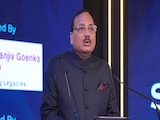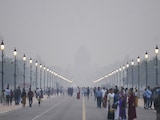British Foreign Minister James Cleverly raised the tax searches on the BBC with Foreign Minister S Jaishankar during a bilateral meeting today, ahead of a meeting of G20 ministers. Mr Jaishankar "firmly told" his UK counterpart that all entities operating in India must comply with the law of the land, sources said.
"All entities operating in India must comply fully with relevant laws and regulations," the UK Foreign Minister was told, according to sources.
Last month, the Income Tax department searched the BBC offices in Delhi and Mumbai for three days over allegations of irregularities in taxes, diversion of profits and non-compliance. During the survey, senior staff had to stay in office overnight to respond to questions.
The searches came weeks after the British public broadcaster aired a documentary that was critical of Prime Minister Narendra Modi's leadership of Gujarat during the 2002 sectarian riots.
After completing the survey, the tax department claimed to have found "several evidences (sic)" indicating that "tax has not been paid on certain remittances which have not been disclosed as income in India by the foreign entities of the group".
The survey had thrown up discrepancies and inconsistencies on transfer pricing documentation, the tax department alleged.
Days later, the British government strongly defended the BBC and its editorial freedom.
"We stand up for the BBC. We fund the BBC. We think the BBC World Service is vital. We want the BBC to have that editorial freedom," said David Rutley, Parliamentary Under-Secretary of the Foreign, Commonwealth and Development Office.
"It criticises us (government), it criticises the (Opposition) Labour party, and it has that freedom that we believe is so important. That freedom is key, and we want to be able to communicate its importance to our friends across the world, including the government in India," he stressed.
The tax surveys were widely criticized by opposition parties, who accused the government of retaliating against the BBC for the unflattering documentary.
The BBC's two-part series titled "India: The Modi Question", examines allegations that PM Modi, as Chief Minister of Gujarat, didn't do enough to stop the 2002 riots - allegations that were dismissed by the Supreme Court. The government used emergency powers to take down posts sharing the documentary in January.
Foreign Minister Jaishankar, in an interview last week, said the timing of the BBC documentary is "not accidental" and denounced the narrative in the foreign media.
"There's a phrase - war by other means. Think of it - this is politics by other means. Why is there suddenly a surge of reports, attention, and views? Will some of these things not happen again?" Dr Jaishankar said, responding to a question.
"I mean, do you doubt it? Look who the cheerleaders are. What is happening is, just like I told you -- this drip, drip, drip -- how do you shape a very extremist image of India, of the government, of the BJP, of the Prime Minister. I mean, this has been going on for a decade, " said Dr Jaishankar.
The motive behind such stories abroad was to further the anti-India agenda, he said, challenging those behind the narrative to come to the political arena.















